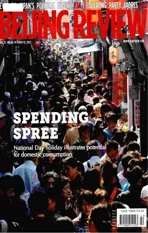Ordinary Times in an Extraordinary Life
2012-10-16ByMartaCaccamo
By Marta Caccamo
Ordinary Times in an Extraordinary Life
By Marta Caccamo

LI SHIGONG
Every time I go back to Italy people ask me: “How does it feel living in China?”
I know what they want to hear: Pollution is bad, the food is bad, the people are bad, but the pay is good. Instead I answer simply, “It’s normal.”
It really does feel normal. And it’s not the kind of boring normal one would imagine.
My typical day starts at 6 in the morning. I go running in the campus of University of International Business and Economics (UIBE). Someone wandering around the campus at that time of day would think the average age of UIBE’s student population is 65. But I like it. I like smiling at everyone and admiring their flexibility. And it’s true indeed! The older they are, the more they can stretch those bodies.
After my intense workout (well, sort of), I go to the market. I enjoy having daily encounters with unknown vegetables of undefined origin there. I never stop being surprised. One day I meet a violet potato, the next day a yellow watermelon, and so on.
At “my” market, people can actually speak Italian. I taught my trusted vegetable lady how to say “Buongiorno” (“good morning”). It’s a lovely reminder of home.
At 7:30, it’s finally breakfast time. I’m always undecided whether to choosecai baozi(steamed buns filled with veggies and bean curd) orzhengjiao(steamed pork dumplings). Sometimes I havejianbing, a kind of big French crepes with an egg and some sauces.Jianbingis common everywhere in China, but different regions have different kinds. Shanghai’s spicy version, in my opinion, is the winner.
There are many stalls selling the same things, but I have a trick to not be disappointed. As always in China: go with the flow. Cues signal quality. Breakfast is fundamental; one cannot risk a bad start to the day. Better to wait slightly longer and patiently line up for a juicybaozi, rather than stay content with the first option.
After getting dressed in about three minutes to recoup the time invested in my“morning rituals,” I walk to the office. I am lucky enough to not have to squeeze myself into a Beijing subway. When I was living in Shanghai a couple of years ago, my home was at the stop before People Square, the central hub of all metro lines, and work was located two stops after. That period threatened my usual good mood. Anyone willing to take a subway in China at 8:30 in the morning should be prepared for a “survival quest.”
By the time I get to the office 10 minutes later, I’ve already risked being hit by a car several times. Italy and China are very similar in this respect. Traffic lights have more of an ornamental function than a practical one. But it’s nothing I can’t handle.
At 9 o’clock, the door of the office opens and I need a coffee. I brought an electric Moka from Italy.
Now let’s go back to the initial issues. “Air is bad”: I can breathe and run, so it can’t be that terrible. “Food is bad”: try it and tell me if you want to go back. “People are bad”: try smiling. “Pay is good”: I can make a living in China. But keep your expectations in check.
What about the “Expats’ life?” Isn’t it all partying and skyscrapers in today’s “Center of the World?”
Well, sometimes it is. Expat status raises foreigners to the level of minor celebrities. You are instantly invited to openings, fairs, exhibitions and gala dinners. Everybody here suffers from an incurable disease, which experts refer to as“Networking Fever.” For the uninitiated, it refers to a spasmodic search for contacts. Relationships are truly the key to success in China. There is a unique rule in the life of an expat in Beijing: “You must know everybody.”
We expats are really lucky to be here, but the life can be tiring. You see people coming and going. You don’t know how long you are going to stay. And you can never relax. You cannot even enjoy your dinner. The unassuming man sitting next to you could become a potential business partner.
Tomorrow morning I’m meeting the Italian Ambassador. But that won’t be the best part of my day. What I’m looking forward to most is going home in the evening and havinghuoguo—or hot pot—with my Chinese flatmate. If you haven’t experienced it, you are missing out on a wonderful opportunity. You are missing China.
The author is an Italian living in Beijing
